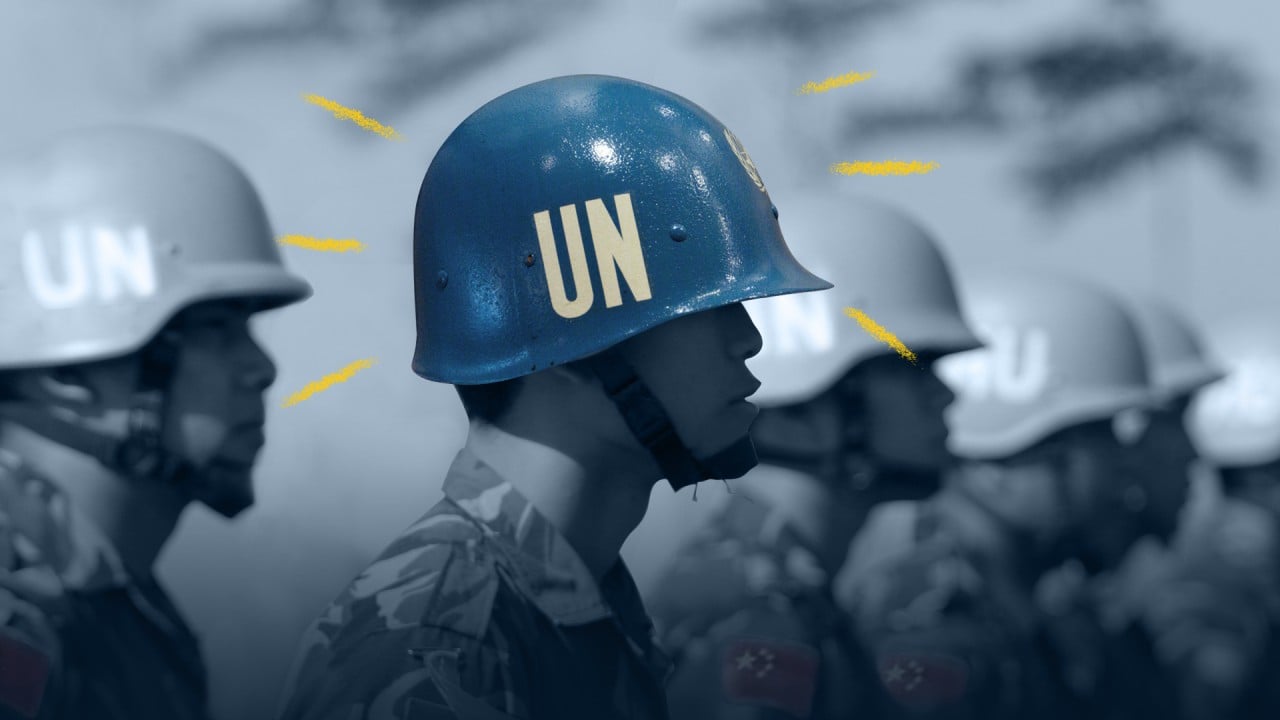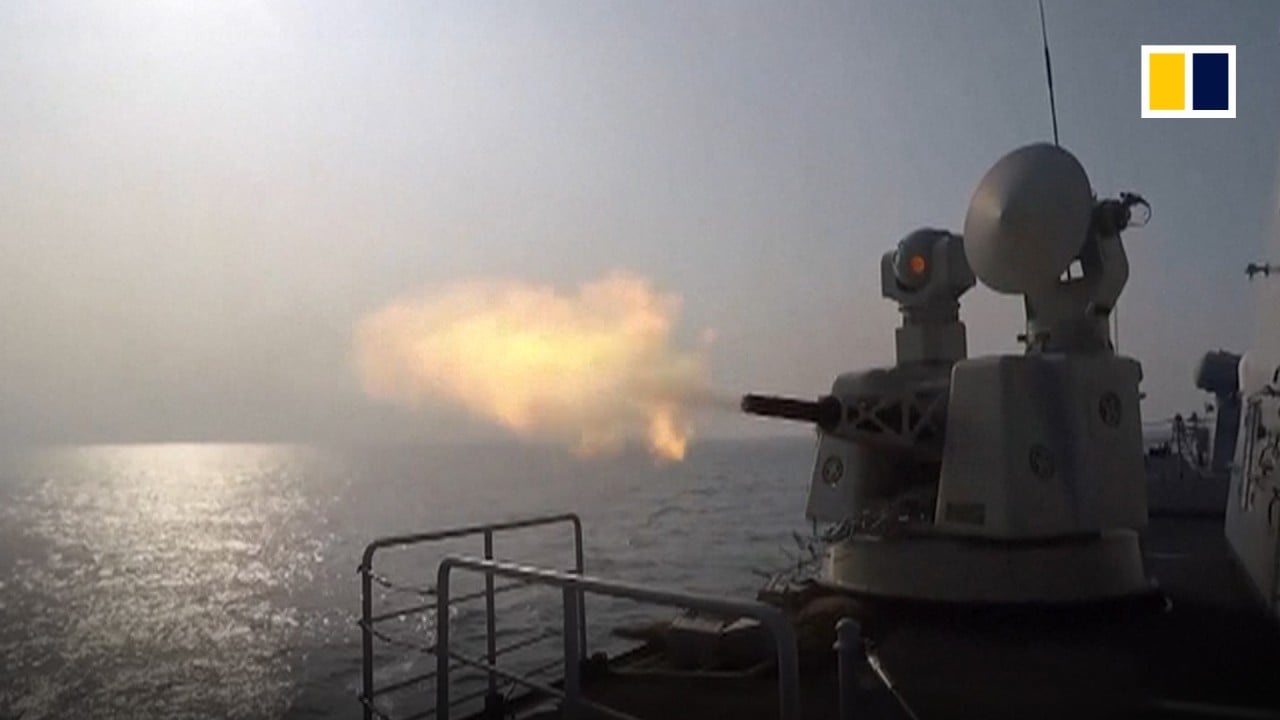
China puts its military to the test in African peacekeeping roles
- PLA’s involvement in UN missions has been an opportunity to accumulate experience at relatively low cost, observers say
- Many of China’s latest weapons and platforms have been tested in African waters, as Beijing seeks to extend its reach
In a recent analysis of Chinese military interests in Africa, Nantulya found PLA naval vessels have escorted 7,000 Chinese and foreign ships in the region since joining the UN-backed effort.
Operations to evacuate stranded Chinese citizens in Libya in 2011 and Yemen in 2015 featured some of China’s newest guided missile frigates – the Xuzhou in Libya, and the Linyi and Weifang in Yemen.
“Simply put, Africa is a testing ground for China’s ‘far seas’ operations. Alongside them, the PLA conducts port calls, joint military drills, and offshore military education – improving its interoperability, knowledge of foreign forces, surveillance, and intelligence at a relatively low cost,” Nantulya said.
“The PLA’s accumulated experience in African waters arguably positions it for more complex future tasks.”
Nantulya said Beijing deployed its most capable commanders to the missions, with each flotilla led by at least a rear admiral. The PLA’s 18th mission in African waters, in 2014, included a nuclear-powered attack submarine for the first time.
“This raised concern because submarines typically are not suited to anti-piracy operations,” he said.
Many of the PLA’s latest weapons and platforms have been tested in African waters, including the Type 054 guided missile frigate and Type 052D destroyers, as well as anti-submarine Z-9C helicopters, Type 071 amphibious transport dock, and the improved Type 903 replenishment ships.
“A Chinese carrier strike group has not yet sailed to Africa, however, commercial satellite imagery suggests the recent upgrade of piers in Djibouti are large enough to hold aircraft carriers in the future,” Nantulya said.
David Shinn, a professor at George Washington University’s Elliott School of International Affairs, agreed that Africa was a testing ground for China’s far seas goals and operations, with its military base in Djibouti a case in point.
US accepts China’s peacekeepers in Africa but wary of military moves
“Somali piracy has not been a serious issue for a number of years, yet China continues regularly to send escort missions, including its most modern surface ships and an occasional submarine, to the Gulf of Aden,” he said, adding that submarines were not appropriate for anti-piracy duty.
“China uses Djibouti to train its naval personnel in the far seas and test its ships and equipment under harsh conditions. Until Covid-19 hit, the PLA Navy was significantly increasing its port calls around Africa.”
At a virtual meeting last week of naval and coastguard leaders and representatives from 19 countries around the Gulf of Guinea, the Chinese navy warned that “global maritime security is facing increasing instability and uncertainty, and piracy activities in the Gulf of Guinea are also on the rise”.
PLA Navy Commander Admiral Dong Jun said Beijing was “willing to increase the support in personnel training and other areas, provide assistance in information sharing and maritime rescue, carry out regular exchange of ship visits and joint training and exercises with relevant countries”.
Dong said China was also willing to expand practical cooperation in the areas of exchanges between military academies, medical services and hydrographic surveys.
The meeting was aimed at implementing the Global Security Initiative – unveiled by Chinese President Xi Jinping in April – and strengthening maritime security cooperation with the armed forces of countries surrounding the Gulf of Guinea.
Benjamin Barton, an assistant professor at the University of Nottingham’s Malaysia campus, said the African continent offered China and the PLA Navy opportunities to try out initiatives which they might be reluctant to test elsewhere.
“Africa is not at the heart of Sino-US rivalry in the same way that the Indo-Pacific, Taiwan Strait and South China Sea are, where the PRC’s actions are more closely monitored and contested,” Barton said, referring to the People’s Republic of China.
China drums up support for global security push in Latin America
“Africa offers more such opportunities, sadly, due to general instability and or the absence of capacity for states to tackle specific security concerns, as was the case with the outbreak of Somali piracy,” he said.
“There is also clearly demand from some African leaders, [such as] Yoweri Museveni of Uganda and Paul Kagame of Rwanda, to see China play a greater role as a security provider either for domestic reasons or to counter the presence or influence of other external powers.”
Barton said it was not really surprising that China “has attempted to implement parts of its ‘far seas’ philosophy in Africa as a starting point”.
He also pointed out that it had taken the PLA more than two decades to send combat troops to a UN operation, after China’s first contribution to peacekeeping efforts, in Cambodia in the early 1990s.
Barton said the time frame spoke volumes about China’s reticence to expose its forces to combat situations, despite an obvious desire to remedy the gap in its troops’ experience.
Zhou Yuyuan, a senior research fellow at the Centre for West Asian and African Studies at the Shanghai Institutes for International Studies, said the development of a far seas capability was part of China’s defence white paper, including the establishment of overseas logistics points.
“I believe this is a normal pursuit of military development. Its aims are confined to providing protecting capabilities and responsible international cooperation, such as providing sea lane security, undertaking evacuations and humanitarian assistance,” he said.
‘China’s now a big player’: why Beijing is doing more in Horn of Africa
Zhou said China had also been a steady partner of the UN peacekeeping mission in South Sudan, since deploying a 700-strong infantry battalion there in 2015.
“[The mission] reflects that China expects to play constructive roles in African security affairs and to be a responsible peace and security partner, especially after Xi Jinping made sound commitments at the UN peacekeeping summit in 2015,” he said.
China’s participation in African peace and security affairs is not necessarily an opportunity to give its troops combat experience, according to Zhou.
“Of course, a peaceful condition will benefit China for its commercial interests and human security. Because peacekeeping is operated under strict mandate, I don’t believe it is a reason for China to test its combat forces,” he said.
“Maybe there are very few chances for them to carry out real combat, and the so-called testing value seems very minimal.”

Observers say South Sudan offered the PLA an opportunity to provide training for its forces, test its equipment under harsh conditions, and learn more about Africa and the military strengths and weaknesses of other military forces involved in the operation.
John Calabrese, head of the Middle East-Asia Project at American University, said China’s contribution to the UN effort in South Sudan helped to protect Chinese investments, especially in the energy sector, while preventing the conflict spilling into neighbouring states where China also had significant economic stakes.
“Deployment of a combat infantry battalion to fulfil the Blue Helmets mission probably had as much to do with the perceived need to have Chinese personnel that are trained and equipped to use their weapons, given the volatile security conditions, as with the desire to train and test soldiers and their gear,” he said.
China’s big military mission: to train elite commanders for joint operations
Lina Benabdallah, a specialist in China-Africa relations at Wake Forest University in North Carolina, said many analysts had mentioned how peacekeeping operations in Africa were a good opportunity for Chinese soldiers to get some essential combat experience.
“This is not unique to the case of Chinese troops in peacekeeping missions in Africa. Other nations justify their participation in UN missions following the same logic,” she said.
“It is not odd or unusual that states deploy in peacekeeping missions to maintain a certain level of preparedness, gain experience, and similar goals. China is not an exception here.”



